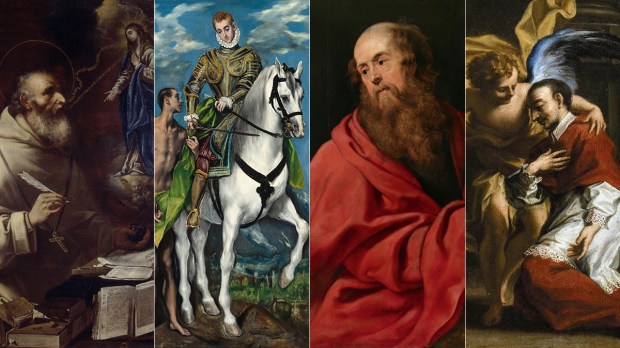Lenten Campaign 2025
This content is free of charge, as are all our articles.
Support us with a donation that is tax-deductible and enable us to continue to reach millions of readers.
November is the month dedicated to the Holy Souls in Purgatory. During November, we should remind ourselves of what we can do for those who have gone before us and are in need of our prayers, fasting, and good works.
Five saints of November reflect the importance of working for God and they encourage us to do the same. We can turn to their words the next time we need a good reminder.
So spend some time with a tireless cardinal, a selfless soldier, a holy scientist, a hardworking pope, and the “first-called” apostle. They all have something powerful to say about working for God!
November 4 – St. Charles Borromeo (1538-1584)
Few people have worked more tirelessly for God than St. Charles Borromeo. Made a cardinal at a young age, this patron saint of seminarians and bishops is famous for his courageous leadership during a bad plague in the city of Milan.
While others, including priests, were fleeing Milan or hiding out, abandoning all who needed help out of their fear of death, St. Charles acted selflessly. He led the priests in taking care of the sick and administering the sacraments.
“Do not prefer a late death to a holy one,” he said in a note to the absent priests. At the end of the plague, it turned out that not one of the priests who ministered to the sick got sick themselves; but many of those who had refused to help were stricken by the illness.
St. Charles Borromeo is a hero in the fullest sense of the word, as he took action, saving people in body and in soul. Here is a beautiful prayer invoking the assistance of St. Charles. In his own words:
“The candle that gives light to others must itself be consumed. Thus, we also have to act. We ourselves are consumed to give a good example to others.”
November 11 – St. Martin of Tours (died 397)
St. Martin was the son of pagans, but became a Christian catechumen at the tender age of 10, all on his own. He became a Roman soldier and famously divided his cloak in half and gave part of it to warm a cold beggar. In a dream that night, St. Martin saw Jesus wearing the cape and saying, “Martin is only a catechumen but has covered me with this garment.”
When Martin resigned from the Roman army, he declared that it was time for him to become a soldier for God. St. Martin became Bishop of Tours in 372. Here is a novena to St. Martin. In his own words:
“Lord, if your people need me, I will not refuse the work. Your will be done.”
November 15 – St. Albert the Great (1200-1280)
A German Dominican, St. Albert became an illustrious medieval scholar, considered one of the greatest minds of all time and a leading scientist of his age. He was the theology teacher of St. Thomas Aquinas. When the fellow students of Aquinas made fun of him and called him a “dumb ox” because he was corpulent and slow in speech, St. Albert defended Aquinas, saying, “Ox he is, and his bellowing in doctrine will one day be heard throughout the world.”
St. Albert was appointed a bishop yet still remained a humble Dominican in spirit, refusing to ride a horse but rather journeying everywhere by foot. Along with being a brilliant scholar, he was a man who greatly loved God and neighbor. St. Albert’s holy example reminds us of the necessity of doing works of charity.Here is a prayer to St. Albert. In his own words:
“It is by the path of love, which is charity, that God draws near to man, and man to God. But where charity is not found, God cannot dwell. If then, we possess charity, we possess God, for God is charity.”
November 23 – St. Clement I (died 99 AD)
Pope St. Clement was the fourth pope and it is said that he was ordained by St. Peter himself! The patron saint of fisherman, his martyrdom came about when he was thrown from a boat. For this reason, he is often depicted in art history with the anchor to which he had been tied.
This friend of the apostles gave everything for love of Christ. He not only had a holy death, but he also had a holy life, giving each of his days the structure and discipline of regular prayer.
To emulate his advice, which reminds us to pray at appointed times and hours, may we tie our contemplation to action by arranging our lives in such a way that we pray at set hours of the day, such as setting our alarm to pray Divine Mercy each day at 3 p.m. or the Angelus at noon, or learning to pray the Divine Office. In the words of Pope St. Clement I:
“It behooves us to do all things in order, which the Lord has commanded us to perform at stated times, has enjoined offerings and service to be performed … not thoughtlessly or irregularly, but at the appointed times and hours.”
November 30 – St. Andrew (died 60-70 AD)
St. Andrew, known as the “first-called,” was just that — the first of the apostles to be called by Jesus. He had been following St. John the Baptist, and was present when John pointed to Jesus saying, “Behold the Lamb of God!” Andrew spread this good news of finding the messiah to his brother, Peter.
St. Andrew was martyred by being crucified on an x-shaped crucifix. He is the patron saint of Scotland, and the Scottish flag has a white x on a blue background in honor of Saint Andrew.
As an apostle, Andrew worked hard for Christ throughout his ministry and even harder after Pentecost, as he labored to spread the Gospel. Let us emulate the zeal and love of God as we spread the Good News, teaching others by the example of our lives, the words of St. Andrew:
“We have found the Messiah!”
This “first-called” saint kicks off Advent every year with St. Andrew’s day, and his beautiful novena ends on Christmas. It is so appropriate because Andrew longed to meet the Messiah and God granted him his heart’s desire. May we experience the same great desire for the coming of the Christ child as we await Christmas.
Holy saints of November, as we seek and savor your words of wisdom on work, pray for us!



